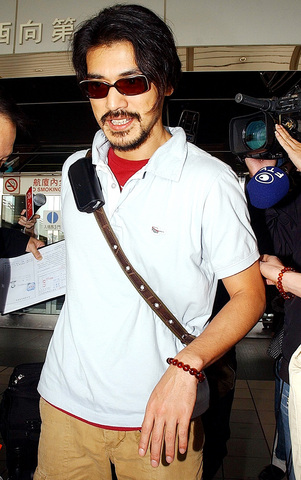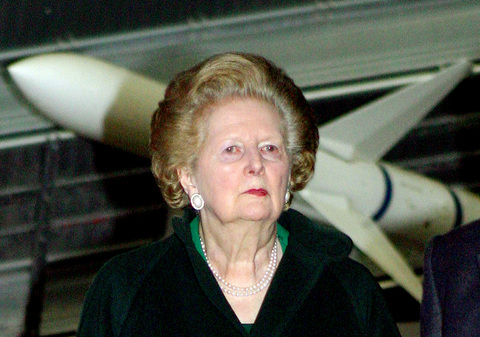Financial backing for director John Woo's (吳宇森) new Chinese epic has not been affected by the pullout of Cannes best actor winner Tony Leung (梁朝偉), Woo's business partner said yesterday.
Woo's US$80 million movie The Battle of Red Cliff (赤壁之戰) hit a snag earlier when Leung, one of Hong Kong's biggest stars, dropped out.
But producer Terence Chang (張家振) said Leung has been replaced by another prominent actor, Taiwanese-Japanese heartthrob Takeshi Kaneshiro (金城武), and that the movie's investors are not rattled by the casting change.

PHOTO: TAIPEI TIMES
"All buyers welcome that decision,'' Chang said in an e-mail.
Kaneshiro's credits include Zhang Yimou's (張藝謀) House of Flying Daggers (十面埋伏) and Wong Kar-wai's (王家衛) Chungking Express (重慶森林).
Chang wouldn't say if the casting change would affect the movie's shooting schedule.

PHOTO: EPA
Red Cliff is based on a battle of the same name in 208AD that determined the geography of the Three Kingdoms period, when China had three separate rulers. It also stars Chow Yun-fat (周潤發) and Lin Chi-ling (林志玲).
Chang said earlier shooting will start in later this month in and near Beijing.
A Chinese producer and director who screened an uncensored movie at the Berlin Film Festival last month have so far escaped punishment, the producer said earlier this week, adding that the filmmakers will continue to test censors' tolerance with their work.
The fate of the filmmakers behind Lost in Beijing (蘋果) has drawn attention because two of their Chinese counterparts were banned from making movies for five years after showing a film at the Cannes Film Festival last year without government approval.
Producer Fang Li (方勵) and director Li Yu (李玉) went through a protracted censorship process in China that saw them editing Lost in Beijing five times before it was cleared to screen in Berlin.
The producer said earlier he cut a side character, scenes involving dirty streets, prostitutes, gambling, the Chinese national flag, as well as Beijing's Tiananmen Square — the site of pro-democracy protests that prompted a bloody military crackdown in 1989.
Fang, however, ended up screening the uncensored version of the movie in Berlin in mid-February, saying he didn't have time to finish post-production and add subtitles to the censored cut.
Fang said in a telephone interview speculated he wasn't punished because the Chinese government doesn't want to draw attention to the case.
"If they punish me ... everyone's going to hear about this. The press is going cover this. It just makes them look bad,'' he said.
Lost in Beijing is about the tangled relationship between two couples in the Chinese capital.
Also testing the boundaries is a prominent Malaysian director whose last two movies were banned by censors. Amir Muhammad is courting fresh controversy with plans for a semi-documentary film about a 1998 massive street protest that roiled national politics.
Muhammad wrote on his blog Thursday that he chose a "very explicit'' title for the project, called Do You Remember the 20th Day of September, which will feature interviews with people who held an anti-government march in Kuala Lumpur, Malaysia's largest city, on Sept. 20, 1998.
The rally saw tens of thousands of people demanding the resignation of then-Prime Minister Mahathir Mohamad after he fired his popular former deputy, Anwar Ibrahim, who was later charged and convicted of corruption and sodomy.
Tom Cruise is to star in a World War II thriller about a plot to assassinate Adolph Hitler, it has been reported.
The 44-year-old Mission Impossible star will take a central role of the untitled film, which will be directed by Bryan Singer of The Usual Suspects and Superman Returns fame, reports said.
The movie is based on a real-life plot hatched by German generals to kill Hitler during World War II.
In related news, Margaret Thatcher is getting the British film treatment. London-based producer and distributor Pathe Productions said Tuesday it had commissioned a film about the former prime minister, set during the 1982 Falkland Islands war with Argentina.
Pathe said the film would cover the 17 days leading up to the conflict and focus on the Iron Lady's controversial decision to go to war over Britain's sparsely populated possessions in the South Atlantic.
Argentina, which claims the islands, invaded them in April 1982, and its troops were evicted two months later by a British task force.
More than 200 British soldiers and 655 Argentineans died in the war, but Britain's victory boosted Thatcher's flagging popularity.
Her Conservative Party went on to win the 1983 election by a landslide, and she remained in power until 1990, transforming British society with her free-market policies.
The Thatcher film has yet to be cast, and no director has been named.

On April 26, The Lancet published a letter from two doctors at Taichung-based China Medical University Hospital (CMUH) warning that “Taiwan’s Health Care System is on the Brink of Collapse.” The authors said that “Years of policy inaction and mismanagement of resources have led to the National Health Insurance system operating under unsustainable conditions.” The pushback was immediate. Errors in the paper were quickly identified and publicized, to discredit the authors (the hospital apologized). CNA reported that CMUH said the letter described Taiwan in 2021 as having 62 nurses per 10,000 people, when the correct number was 78 nurses per 10,000

As Donald Trump’s executive order in March led to the shuttering of Voice of America (VOA) — the global broadcaster whose roots date back to the fight against Nazi propaganda — he quickly attracted support from figures not used to aligning themselves with any US administration. Trump had ordered the US Agency for Global Media, the federal agency that funds VOA and other groups promoting independent journalism overseas, to be “eliminated to the maximum extent consistent with applicable law.” The decision suddenly halted programming in 49 languages to more than 425 million people. In Moscow, Margarita Simonyan, the hardline editor-in-chief of the

Six weeks before I embarked on a research mission in Kyoto, I was sitting alone at a bar counter in Melbourne. Next to me, a woman was bragging loudly to a friend: She, too, was heading to Kyoto, I quickly discerned. Except her trip was in four months. And she’d just pulled an all-nighter booking restaurant reservations. As I snooped on the conversation, I broke out in a sweat, panicking because I’d yet to secure a single table. Then I remembered: Eating well in Japan is absolutely not something to lose sleep over. It’s true that the best-known institutions book up faster

Though the total area of Penghu isn’t that large, exploring all of it — including its numerous outlying islands — could easily take a couple of weeks. The most remote township accessible by road from Magong City (馬公市) is Siyu (西嶼鄉), and this place alone deserves at least two days to fully appreciate. Whether it’s beaches, architecture, museums, snacks, sunrises or sunsets that attract you, Siyu has something for everyone. Though only 5km from Magong by sea, no ferry service currently exists and it must be reached by a long circuitous route around the main island of Penghu, with the